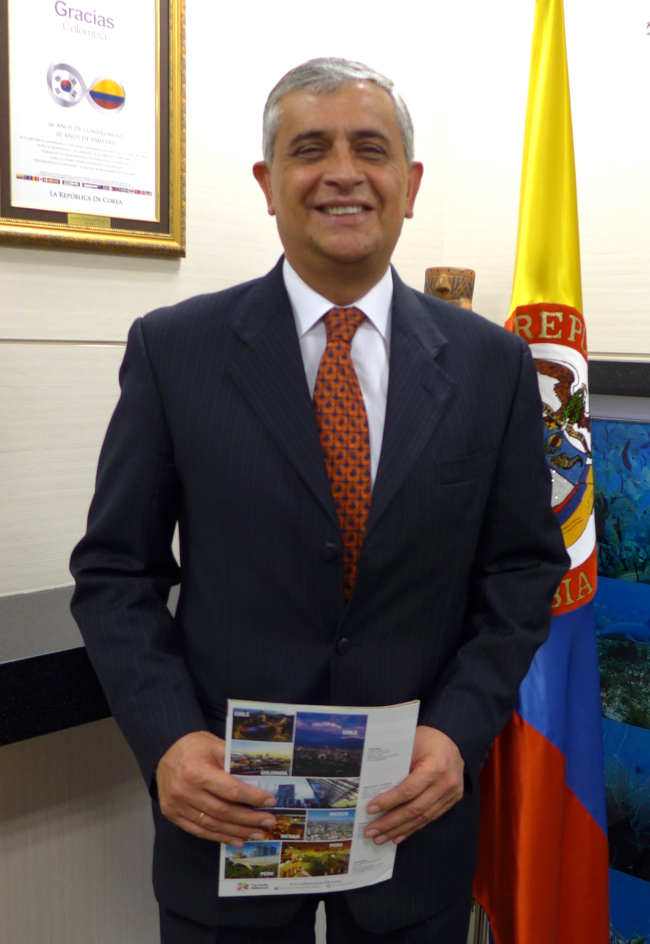Colombia, Korea partner in trade, defense, education
By Korea HeraldPublished : Feb. 15, 2015 - 18:55
“When Korean people think about Colombia, I want them to think about our Juan Valdez coffee, beautiful men and women and a land of opportunities,” Colombian Ambassador Tito Saul Pinilla told The Korea Herald in an interview last week.
“Korea’s perception of my country had been dominated by drug and violence, a thing of the past.”
Bolstered by Colombian Foreign Minister Maria Angela Holguin’s visit to Korea in January, the ambassador said both countries could cooperate in a broad range of areas ― free trade, defense, education, art and culture ― this year and beyond.
“The three pillars of our President Juan Manuel Santos’ government, now in second office, are education, peace resolution and creation of an equal society,” Pinilla said. “As a country with highly educated citizens, peace and stability, Korea is our perfect partner toward these goals.”
“Korea’s perception of my country had been dominated by drug and violence, a thing of the past.”
Bolstered by Colombian Foreign Minister Maria Angela Holguin’s visit to Korea in January, the ambassador said both countries could cooperate in a broad range of areas ― free trade, defense, education, art and culture ― this year and beyond.
“The three pillars of our President Juan Manuel Santos’ government, now in second office, are education, peace resolution and creation of an equal society,” Pinilla said. “As a country with highly educated citizens, peace and stability, Korea is our perfect partner toward these goals.”

Colombia and Korea signed a bilateral free trade agreement in February last year, and the agreement is currently being reviewed by Colombia’s Supreme Court. It is expected to come into force around June, according to the embassy.
The two countries currently have a trade imbalance: Colombia exported $207 million worth of goods in 2013, while Korea exported over six times more at $1.34 billion. Pinilla said the gap would narrow and more Colombian produce would be available in Korea once the FTA goes into effect.
The ambassador, a former Air Force general, noted, “Political stability in Colombia has increased significantly after 2000 thanks to our military that did an amazing, amazing job of defeating the FARC (Revolutionary Armed Forces of Colombia) terrorist group.”
With increased security, foreign investment has poured into Colombia, creating jobs and new middle classes, he said.
Pinilla stressed that there are massive investment opportunities for Korean firms in Colombia, particularly in developing infrastructure, energy and agriculture. The country has high demand for highways, railroads, airports and ports.
The Bogota Metro project, which aims to build a $7 billion subway system in the capital city, will open bidding for foreign companies in the second half of this year. The city government plans to open its first 32-kilometer line, serving 27 stations by 2020.
Colombia has one of the highest economic growth rates and lowest inflation rates in Latin America, at 4.3 percent and 3 percent, respectively. The volume of foreign direct investment in the country rose from $6.8 billion in 2010 to $16.8 billion in 2013.
Around 40 Korean companies operate in Colombia with their cumulative investment surpassing $70 million.
Pinilla emphasized that small and medium-sized Colombian and Korean enterprises in auto-manufacturing and cosmetics have room to collaborate through joint ventures: sharing information, technology and resources.
Regarding the peace process that began in November 2012 to end half a century of armed conflict between the FARC guerrilla organization and the Colombian government, Pinilla said, “Our government pressed on with aggressive assaults on the guerilla fighters and brought them to their knees. Realizing they could not keep their powers in Colombia, the FARC leaders gave in to the peace process.”
FARC has killed more than 220,000 people for the last 50 years since it was founded in response to violent government repression of popular progressive movements in the 1950s and ’60s.
“The FARC used to align itself with the socialist camp with financial and military backing,” Pinilla said. “But with its funding dried up after the breakup of the Soviet Union, it turned to narcotics trafficking to finance its operations.”
Three parts of the five-point agenda ― land reform, political participation and ending narco-trafficking ― have been negotiated. The other two are under negotiation ― ending the conflict and compensating the victims.
“FARC will exist as a nonarmed political party within our democratic system,” Pinilla explained, adding that Colombian Defense Minister Juan Carlos Pinzon will visit Korea before the end of April to deal with the postconflict situation.
The ambassador pointed to the high level of military cooperation between Colombia and Korea following presidential and ministerial visits over the last three years. Korean warships have been sent to Colombia to help patrol the seas against narco-traffickers, he said.
More than 5,100 Colombian troops fought in the Korean War (1950-53) as part of the United Nations Forces; mostly between ages 18 and 21, 131 soldiers died in combat, 69 disappeared and 476 were injured.
Colombia and Korea established diplomatic relations in 1962 and became strategic partners in 2013.
Colombia’s Finance Minister Mauricio Cardenas Santa Maria and Education Minister Gina Maria Parody d’Eecheona are to visit Korea by the end of April.
By Joel Lee (joel@heraldcorp.com)
-
Articles by Korea Herald




![[Herald Interview] 'Amid aging population, Korea to invite more young professionals from overseas'](http://res.heraldm.com/phpwas/restmb_idxmake.php?idx=644&simg=/content/image/2024/04/24/20240424050844_0.jpg&u=20240424200058)













![[KH Explains] Korean shipbuilding stocks rally: Real growth or bubble?](http://res.heraldm.com/phpwas/restmb_idxmake.php?idx=652&simg=/content/image/2024/04/25/20240425050656_0.jpg&u=)

